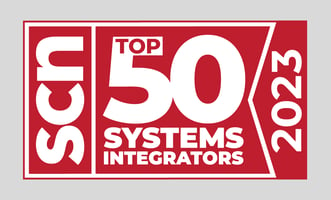No matter what size your organization is, what line of business you’re in, or who you serve, you...
Hybrid Work Environments: The Key to Collaboration
To manage hybrid work environments, you must decipher what platform best fits your organization’s needs and figure out the logistics of how your users will effectively use the tool. To better understand what path should be taken it’s important to understand the difference between platform agnostic and device agnostic. Platform agnostic describes any hardware or software that is unattached to a specific platform or environment and can operate as needed regardless of what option is chosen. Device agnostic is when a specific software can run on all types of devices including laptops, smartphones and tablets.

The “Bring Your Own” (BYO) trend has been gaining momentum as of late with the increase in remote work, hybrid meetings, and video conferencing applications. Agnostic conferencing plays a large role in supporting hybrid work environments. BYO gives users the chance to control the meeting and room technology using their own devices and preferences of choice. Easy-to-use room systems that provide a high degree of user flexibility while lowering costs and complexity highlight the advantages of BYO.
That is accomplished by leveraging all that users bring to the meeting room on their devices such as conferencing applications, content, productivity applications, calendars and more. Dedicated room systems were fine in the past, but the workplace has changed dramatically in the last few years. Regardless of the equipment being used, the attendees, and the type of meeting, AV systems are expected to work seamlessly to support a multitude of meeting demands. With workplaces and educational institutions embracing hybrid models and increasingly dynamic work environments there must be greater flexibility in how we meet.
Meeting rooms must support collaboration in a hybrid work environment. Here are some of the biggest factors supporting the BYO movement.
1. Time Saved
When users are given the opportunity to use the devices and applications they are most familiar with, ones they have chosen, there is time saved that would have otherwise be wasted on IT onboarding and having to learn how to use company issued tools. When time can be efficiently used this in turn results in increased employee productivity. IT support tickets are often decreased with a BYO model as well. When there is a specific amount of allocated time for a meeting space its crucial that the time is not wasted on IT issues.
2. Multiple conferencing options
If our workspaces and technology don’t embrace that the way we meet is changing they risk becoming obsolete. As workers continue to re-enter the workplace during our recovery from the pandemic, many on a limited or ad hoc basis, it’s critical that they can still utilize the conferencing applications that they relied on and got comfortable with while working from home. Dedicated room systems that are often vendor-locked are due for an upgrade. Even if your office elects to keep the dedicated room systems it will be important to at least pair them with agnostic conferencing technologies so that users will have the option of a meeting space that offers ultimate flexibility.
3. Employee Satisfaction
There is no denying that the workplace and the workforce is changing. An increasingly popular recruitment strategy is to lure in young, tech-savvy potential employees with a BYO policy. Organizations who fail to adapt may struggle to attract new talent and possibly see issues arise with retaining current talent. Employee morale is raised and job satisfaction is increased when users have the ability to leverage devices, video conferencing tools and other collaboration apps of their choosing.
4. Flexible workplace design
During the pandemic we have come to accept that the only thing certain is uncertainty. Organizations often find themselves aiming at a moving target in the dynamic hybrid workplace. Office needs are in flux and are always changing. Planning for such a fluid environment and being able to adapt has taken on heightened significance. Agnostic conferencing platforms provide organizations with more adaptability to stay on top of their changing needs by delivering the highly demanded flexibility users crave.
Since these solutions are run from the user’s own devices valuable freedom is granted in terms of workspace design while simultaneously creating a cost-effective and scalable solution for all spaces. These days, many large conference rooms sit empty, and it would be wise for organizations to consider repurposing these spaces to be more useful. One answer may be to split them up into smaller huddle spaces can be reconfigured as needed to support both small groups and hybrid collaboration. The opportunity to integrate with existing infrastructure and investments while also providing organizations with a cost-effective and flexible solution to scale technology make BYO solutions the way to go.
5. Innovation
A space for knowledge sharing, idea generation, efficiency, productivity, and innovation is fostered with a BYO deployment that grants employees the freedom and flexibility to find their own best way of working and collaboration. The most valuable assets for a company in the knowledge-based economy are highly skilled employees. Nurturing, sharing, and making the best use out of employee’s knowledge can be accomplished with a successful BYO strategy.
ACP CreativIT is happy to help your organization create an environment where a BYO strategy can be successfully deployed. Contact us to talk to one of our experts today or visit our video conferencing page here.



